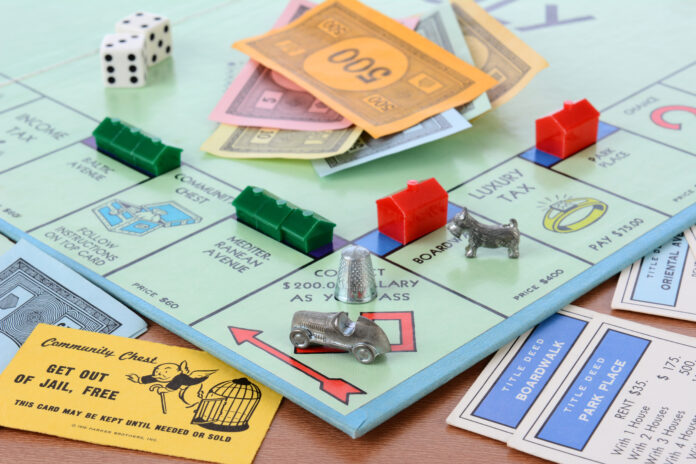
Monopoly, a fun game about money? Or a statement on American greed?
Monopoly was created by a woman named Magie, “and in 1904, Magie received a patent for an invention she called the Landlord’s Game, a square board with nine rectangular spaces on each side, set between corners labeled ‘Go to Jail’ and ‘Public Park.’ Players circled the board buying up railroads, collecting money and paying rent. She made up two sets of rules, ‘monopolist’ and ‘anti-monopolist,’ but her stated goal was to demonstrate the evils of accruing vast sums of wealth at the expense of others” (Pilon, 2015).

Her goal was to make people “discover that they are poor because Carnegie and Rockefeller, maybe, have more than they know what to do with” (Pilon, 2015).
The purpose of the Landlord’s Game or the game currently known as Monopoly was to discredit monopolies and turn people against them.

“The Landlord’s Game was sold for a while by a New York-based publisher, but it spread freely in passed-along homemade versions: among intellectuals along the Eastern Seaboard, fraternity brothers at Williams College, Quakers living in Atlantic City, writers and radicals like Upton Sinclair” (Pilon, 2015).
From there it transformed into Monopoly and “Monopoly became a hit, selling 278,000 copies in its first year and more than 1,750,000 the next. But the game lost its connection to Magie and her critique of American greed, and instead came to mean pretty much the opposite of what she’d hoped. It has taught generations to cheer when someone goes into bankruptcy. It has become a staple of pop culture, appearing in everything from One Flew Over the Cuckoo’s Nest and ‘Gossip Girl’ to ‘The Sopranos.’ You can play it on your iPhone, win prizes by peeling game stickers off your McDonald’s French fries, or collect untold ‘Banana Bucks’ in a movie tie-in version commemorating Universal’s Despicable Me 2” (Pilon, 2015).
This change of Monopoly led Magie to list “her occupation as a ‘maker of games'” and “in the column for her income she wrote, ‘0’” which gets rid of her connection to the changed Monopoly (Pilon, 2015).
Did this cultural shift of Monopoly and its popularity aid in a perceptual shift in our financial systems? Can games change the perspectives of people? If so, how can design use the cultural importance of games to promote personal finance and wellbeing?
References:
Pilon, M. (2015, January). Monopoly Was Designed to Teach the 99% About Income Inequality. Smithsonian Magazine. https://www.smithsonianmag.com/arts-culture/monopoly-was-designed-teach-99-about-income-inequality-180953630/



